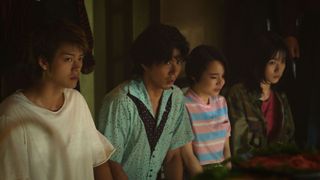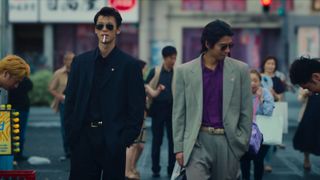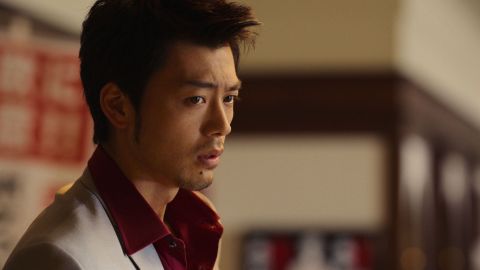GamesRadar+ Verdict
Like a Dragon: Yakuza remixes the story of 2005's Yakuza to present a video game adaptation (led by Ryoma Takeuchi's rock-solid Kiryu) that capably stands on its own two feet – even if it jettisons more of the bizarre elements that have made the series such a success
Pros
- +
Ryoma Takeuchi's take on Kiryu is engaging and is never a mere copy
- +
Like a Dragon's 1995 story is a highlight, gifting Kiryu and Nishiki's story with an extra layer of emotional weight
Cons
- -
Like a Dragon sometimes squeezes in fan service to the detriment of its story
- -
The fight scenes don't pop as much as its game equivalent
Why you can trust GamesRadar+
Like a Dragon is going global. The video game series, previously known as Yakuza in the West, has only grown in popularity since 2015's Yakuza 0, encompassing all manner of turn-based RPGs, secret agent brawlers, and pirate-themed adventures. Now, it's about to be plonked in front of millions of subscribers on Prime Video.
However, Like a Dragon: Yakuza never stretches to the incredulous heights of its gaming cousin. A fairly loose adaptation of the original 2005 video game, the new Amazon series revolves around a more grounded gangster story during two time periods in Kamurochō, a fictional entertainment district in Japan.
In 1995, four teenagers from the Sunflower Orphanage steal money from a yakuza in a heist gone wrong. After being confronted by the head of the Dojima Family, Kiryu (Ryoma Takeuchi) must prove his worth in an underground fighting arena to pay off his debt, while brother-in-arms and jokester Nishikiyama (Kento Kaku) plies his trade as a lowly yakuza in the Tojo Clan. The two girls – Yumi (Yumi Kawai, one of the series' standouts in the few chances she gets to shine) and Nishikyama's sister Miho (Hinano Nakayama) – are sent to become hostesses in Club Serena.
Ten years later, Kiryu – who once harbored ambitions to become the legendary 'Dragon of Dojima' – is released after a significant stretch in prison and has been branded an oyagoroshi (literally 'killer').
Despite being excommunicated from a Family led by the now-cold and calculated career criminal Nishikiyama, Kiryu is immediately thrust front and center of a conspiracy that sees 10 billion yen stolen from the Ohmi Alliance, the long-time rivals of the Tojo Clan. Suddenly, Kiryu is the only thing standing in the way of an all-out yakuza war. Worse still, an oni-masked 'Devil' is prowling the streets, murdering those linked to the case and carving a pentagram onto their bodies.
If that sounds like a lot to cram into six episodes, that's because it is. Yakuza: Like a Dragon gets off to a rocky start thanks to the jarring back-and-forth between decades in its first few entries. Once the show settles into a rhythm, however, it allows the tangled personal drama – which is slightly by-the-numbers in places – to unspool to satisfying effect.
Release date: October 24
Available on: Prime Video
Created by: Sean Crouch and Yugo Nakamura
Episodes: 6
Family comes first

Interestingly, it's fans coming in from the games who will be the ones frequently wrongfooted by the story thanks to it only matching the 2005's PlayStation title's plot in terms of its broad strokes. That is, in part, due to the extended focus on the standout 1995 time period – instead of a straightforward (and forward-looking) adaptation of Kiryu's story in 2005.
The importance of filling in details of Kiryu and Nishikiyama's past is similar to something like The Last of Us in concept, if not always in best-in-class execution. By drilling down into what makes the characters tick, it allows moments later in the season – and a decade ahead in their lives – to be bundled with extra emotional baggage. Whisper it, but it actually improves on the games in that respect, which tend to trade more in last-minute twists and outlandish out-of-left-field character motivations.
That approach also benefits Takeuchi's strong take on Kiryu. Given how iconic the hard-hitting yakuza is, there was always a chance that the iconic gray-and-red suit could hang a little loose on the Kamen Rider actor. What could have been a thankless task is made all the more palatable by Takeuchi's engaging, charming younger Kiryu really laying the emotional stakes out early on in the 1995-era scenes, even if the 2005 version of a righteous, straight-shooting Kiryu resembles something closer to an excellent cosplay at times.
All told, I appreciated that this was an original interpretation of the character and not simply a copy. It's not the game Kiryu – and why should it be? Yakuza: Like a Dragon, if nothing else, is always confident in being its own thing.
Lost in translation

But not every reworking of its source material pays off. Like a Dragon's game series is a uniquely broad church, one where nuanced character work and intense drama co-exists with goofy 'Substories' and an inexplicable mahjong addiction.
Those coming in hoping that the Prime Video series will seamlessly blend Kiryu's crusade against the criminal underworld alongside some of Like a Dragon's more ridiculous elements will be left sorely disappointed. This is a pretty serious adaptation filled with excessive melodrama, especially once it sticks to the 'present day' of 2005. I would have loved to have seen some more personality bursting through the edges of the main story, but I can see why it doesn't contort itself to fit that in.
Some characters away from Kiryu's orbit, too, are products of the show's indecision in not knowing which parts of the original game's story to jettison and which ones to salvage.
The tongue-waving, knife-wielding favorite Majima (Munetaka Aoki) is an especially sad casualty of the slightly more restrained approach to Like a Dragon's story; he never quite fits in, nor does he leave a lasting impression beyond mere fan service. As much as it pains me to say, he probably should have been left out to fight another day.

Some may be disappointed by its failure to stick closely to Yakuza's more colorful side, but that doesn't diminish the end product
The action and fight scenes, which admittedly reach its brutal, bloodied peak during Kiryu's underground scraps, are fairly tame and awkwardly choreographed in places. Emotionally-charged showdowns later in the season also lack the blistering capital-H 'Heat' of a truly great Yakuza boss fight.
Most glaring, though, is something away from the show itself: the slip-ups and typos present in the translations of the six episodes we were given. The odd mistake here and there can be ignored, but Like a Dragon's translation is far too sloppy to overlook. There's every chance it could be fixed for release, but it's a far cry from the stellar English-language localization work that SEGA routinely achieves in the game series.
Like a Dragon: Yakuza wasn't at all what I was expecting – and that's no bad thing. Despite infrequent miscues, it just about works. Some may be disappointed by its failure to stick closely to Yakuza's more colorful side, but that doesn't diminish the end product. Instead, it remixes aspects of the beloved Like a Dragon series into a frequently captivating drama that is only occasionally tripped up by its erratic early structural issues. That, when coupled with the groundwork laid in 1995 and a rock-solid performance from Ryoma Takeuchi as Kiryu, allows Like a Dragon: Yakuza to deliver the first strikes of an eminently watchable crime saga.
Indeed, all the pieces are now present for Like a Dragon: Yakuza to be a success on Prime Video beyond its first season, even with viewers who haven't yet taken in the majesty of Millennium Tower or run through the litter-strewn streets of Theater Square on consoles. As Kiryu might say – that's rad.
The first three episodes of Like A Dragon: Yakuza are available on Prime Video from October 24. For more, check out the Like a Dragon: Yakuza release schedule and our ranking of the best Yakuza games.
I'm the Senior Entertainment Writer here at GamesRadar+, focusing on news, features, and interviews with some of the biggest names in film and TV. On-site, you'll find me marveling at Marvel and providing analysis and room temperature takes on the newest films, Star Wars and, of course, anime. Outside of GR, I love getting lost in a good 100-hour JRPG, Warzone, and kicking back on the (virtual) field with Football Manager. My work has also been featured in OPM, FourFourTwo, and Game Revolution.

